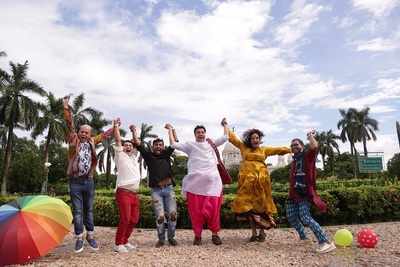- News
- entertainment
- bengali
- movies
- In a free state, they are free to live, free to love
Trending
This story is from September 7, 2018
In a free state, they are free to live, free to love
Every cloud has a silver lining. And now, after years of gloom, a rainbow is in sight.

Every cloud has a silver lining. And now, after years of gloom, a rainbow is in sight. After upholding an outdated law by the British Raj for 157 years, the Supreme Court, on Thursday, defanged Section 377 of the Indian Penal Code which deemed gay sex as a punishable offence. In a landmark judgement in 2009, the Delhi High Court had decriminalised homosexuality, which was later reversed by SC in 2013.In that order, the country’s highest court put the ball in the legislative court, plunging the LGBTQ community in a crisis. Many feared that the new order would lead to more stigma, suppression and subjugation at a time when most were trying to come out of the closet. Finally, Thursday’s judgement, which heralds personal freedom, has spread cheer all across.
BATTLE WITH HUMILATION
Manobi Bandopadhyay, India’s first transgender college principal, said humiliation was a part and parcel of daily life when she was Somnath. “After it was out in the open that I was in a married relationship, my husband filed a defamation suit against me. I was a woman at home, but for the world, I had to be a man. I was not keen on getting his love behind closed doors,” she recalled. In a lighter vein, she added that she had a brush with Section 376 after she accused her husband of rape after a sex reassignment surgery. “The SC gave a verdict in my favour. That was in 2006. And now, I have moved a bit further with Section 377. Even if scrapping of the section, which punishes ‘unnatural sex’, doesn’t hold much meaning for the trans community, I am happy for my gay brothers. It’s the latter, who were discriminated against the most as lesbians couldn’t be charged under the same section,” she said. Even now, when she is out on road, sometimes she comes across comments like ‘chhakka’, ‘hijra’, but said they make no sense to her anymore. “I am hoping this will pave the way for an inclusive society,” she added.
NEEDED A SUPPORT SYSTEM
DIDN’T WAIT FOR APPROVAL
Sujoy Prosad Chatterjee, an interdisciplinary artiste, said his blending of forms did not wait for approvals. “I feel happy, liberated and proactive today. A theatre actress friend from Toronto once told me, ‘I shall keep creating art irrespective of what happens in the White House’. Thursday’s judgement has many dimensions and I hope the most important turns out to be the message of an inclusive society, which the government will have to work on. My personal circumstances don’t change much because I have transcended any regression that is offered to me. I did face trauma and that’s now a part of my art.” Sujoy said he is thankful to his sister, Anuradha Sen, who lives in Toronto and contributed in making him aware of his rights — social and sexual. “I thank her for my streak of activism. My solo play, Happy Birthday, is a huge statement against Section 377. I think my personal experience of feeling humiliated, criminalised and also abused has only strengthened my approach to life and arts.”
FOUND SOLACE IN ART
Another artiste, Sudarshan Chakravorty, said he found solace in the melodies of Saraswati’s veena as a loner in school. “For me, dance has been a great liberator. I was a very fair, lean, bright boy in school. But I had to hear lewd remarks because of my femininity and my not-so-male voice. At the same time, people praised my talent as a dancer. I was star in school and college for my art,” he recalled. And now there is a lot to look forward to. “It is a very happy news for us. This means liberation for millions of the community — people who perhaps lived a dual life, couldn’t overcome their inner fears and slipped into depression because of that; many didn’t even get enough support from friends and family. And now, sky is the limit; we can demand our fundamental rights, one of which is equality. This is indeed the true India, which has embraced the motto of live and let live.”
LIVE AND LET LIVE
The duo of Kaushik and Rajat said they feel liberated now. “We should have been given the right to choose who we want to live with — a man or a woman. As long as we are not murdering someone or causing harm to the country, why should it matter to anyone else? Section 377 should have been quashed long back; we welcome the judgement,” he said. Admitting his love for Rajat, Kaushik told us, “I am in a relationship with Rajat for long and couldn’t care any less about Section 377. At the same time, I am happy that the court has decriminalised homosexuality as this would help everyone to come forward and express their feelings for each other. In a democratic country, every person should have the right to choose their sexual orientation.”
BATTLE WITH HUMILATION
Manobi Bandopadhyay, India’s first transgender college principal, said humiliation was a part and parcel of daily life when she was Somnath. “After it was out in the open that I was in a married relationship, my husband filed a defamation suit against me. I was a woman at home, but for the world, I had to be a man. I was not keen on getting his love behind closed doors,” she recalled. In a lighter vein, she added that she had a brush with Section 376 after she accused her husband of rape after a sex reassignment surgery. “The SC gave a verdict in my favour. That was in 2006. And now, I have moved a bit further with Section 377. Even if scrapping of the section, which punishes ‘unnatural sex’, doesn’t hold much meaning for the trans community, I am happy for my gay brothers. It’s the latter, who were discriminated against the most as lesbians couldn’t be charged under the same section,” she said. Even now, when she is out on road, sometimes she comes across comments like ‘chhakka’, ‘hijra’, but said they make no sense to her anymore. “I am hoping this will pave the way for an inclusive society,” she added.
NEEDED A SUPPORT SYSTEM
Acceptance was an issue for stylist Anupam Chatterjee. In school, he was ridiculed for being “different” and it was the same outside. “When I was in Class VIII-IX, I realised I was drawn towards men. It was difficult for me to come to terms with it and on top of that, many thought I was a bit weird. I remember some of my relatives asked my father why I was interested in art and craft, as that was thought to be a woman’s job. The toughest was to confront my father and make him understand. I first confided in my mother, who did not only understand, but also lent me all the support in the world. Once my father came around, there was no stopping me. I knew I could win the world.” Once he got into the fashion industry and started out by styling models, he found supportive people around. “The scene started changing three-four years back. Even though people’s mindsets have changed, there are many who are yet to come out of the closet. I am hopeful that someday everyone will be able to talk about their sexual orientation without any guilt.”
DIDN’T WAIT FOR APPROVAL
Sujoy Prosad Chatterjee, an interdisciplinary artiste, said his blending of forms did not wait for approvals. “I feel happy, liberated and proactive today. A theatre actress friend from Toronto once told me, ‘I shall keep creating art irrespective of what happens in the White House’. Thursday’s judgement has many dimensions and I hope the most important turns out to be the message of an inclusive society, which the government will have to work on. My personal circumstances don’t change much because I have transcended any regression that is offered to me. I did face trauma and that’s now a part of my art.” Sujoy said he is thankful to his sister, Anuradha Sen, who lives in Toronto and contributed in making him aware of his rights — social and sexual. “I thank her for my streak of activism. My solo play, Happy Birthday, is a huge statement against Section 377. I think my personal experience of feeling humiliated, criminalised and also abused has only strengthened my approach to life and arts.”
FOUND SOLACE IN ART
Another artiste, Sudarshan Chakravorty, said he found solace in the melodies of Saraswati’s veena as a loner in school. “For me, dance has been a great liberator. I was a very fair, lean, bright boy in school. But I had to hear lewd remarks because of my femininity and my not-so-male voice. At the same time, people praised my talent as a dancer. I was star in school and college for my art,” he recalled. And now there is a lot to look forward to. “It is a very happy news for us. This means liberation for millions of the community — people who perhaps lived a dual life, couldn’t overcome their inner fears and slipped into depression because of that; many didn’t even get enough support from friends and family. And now, sky is the limit; we can demand our fundamental rights, one of which is equality. This is indeed the true India, which has embraced the motto of live and let live.”
LIVE AND LET LIVE
The duo of Kaushik and Rajat said they feel liberated now. “We should have been given the right to choose who we want to live with — a man or a woman. As long as we are not murdering someone or causing harm to the country, why should it matter to anyone else? Section 377 should have been quashed long back; we welcome the judgement,” he said. Admitting his love for Rajat, Kaushik told us, “I am in a relationship with Rajat for long and couldn’t care any less about Section 377. At the same time, I am happy that the court has decriminalised homosexuality as this would help everyone to come forward and express their feelings for each other. In a democratic country, every person should have the right to choose their sexual orientation.”
End of Article
FOLLOW US ON SOCIAL MEDIA









